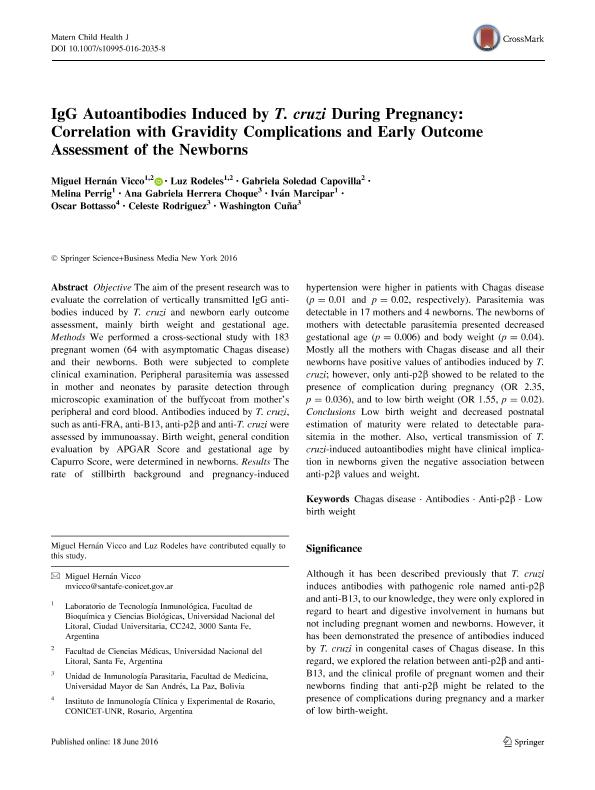Mostrar el registro sencillo del ítem
dc.contributor.author
Vicco, Miguel Hernán

dc.contributor.author
Rodeles Antonelli, Luz María

dc.contributor.author
Capovilla, Gabriela Soledad
dc.contributor.author
Perrig, Melina Soledad

dc.contributor.author
Choque, Ana Gabriela Herrera
dc.contributor.author
Marcipar, Iván Sergio

dc.contributor.author
Bottasso, Oscar Adelmo

dc.contributor.author
Rodriguez, Celeste
dc.contributor.author
Cuña, Washington
dc.date.available
2019-06-13T20:21:58Z
dc.date.issued
2016-10
dc.identifier.citation
Vicco, Miguel Hernán; Rodeles Antonelli, Luz María; Capovilla, Gabriela Soledad; Perrig, Melina Soledad; Choque, Ana Gabriela Herrera; et al.; IgG Autoantibodies Induced by T. cruzi During Pregnancy: Correlation with Gravidity Complications and Early Outcome Assessment of the Newborns; Springer New York LLC; Maternal and Child Health Journal; 20; 10; 10-2016; 2057-2064
dc.identifier.issn
1092-7875
dc.identifier.uri
http://hdl.handle.net/11336/78280
dc.description.abstract
Objective: The aim of the present research was to evaluate the correlation of vertically transmitted IgG antibodies induced by T. cruzi and newborn early outcome assessment, mainly birth weight and gestational age. Methods: We performed a cross-sectional study with 183 pregnant women (64 with asymptomatic Chagas disease) and their newborns. Both were subjected to complete clinical examination. Peripheral parasitemia was assessed in mother and neonates by parasite detection through microscopic examination of the buffycoat from mother’s peripheral and cord blood. Antibodies induced by T. cruzi, such as anti-FRA, anti-B13, anti-p2β and anti-T. cruzi were assessed by immunoassay. Birth weight, general condition evaluation by APGAR Score and gestational age by Capurro Score, were determined in newborns. Results: The rate of stillbirth background and pregnancy-induced hypertension were higher in patients with Chagas disease (p = 0.01 and p = 0.02, respectively). Parasitemia was detectable in 17 mothers and 4 newborns. The newborns of mothers with detectable parasitemia presented decreased gestational age (p = 0.006) and body weight (p = 0.04). Mostly all the mothers with Chagas disease and all their newborns have positive values of antibodies induced by T. cruzi; however, only anti-p2β showed to be related to the presence of complication during pregnancy (OR 2.35, p = 0.036), and to low birth weight (OR 1.55, p = 0.02). Conclusions: Low birth weight and decreased postnatal estimation of maturity were related to detectable parasitemia in the mother. Also, vertical transmission of T. cruzi-induced autoantibodies might have clinical implication in newborns given the negative association between anti-p2β values and weight.
dc.format
application/pdf
dc.language.iso
eng
dc.publisher
Springer New York LLC

dc.rights
info:eu-repo/semantics/openAccess
dc.rights.uri
https://creativecommons.org/licenses/by-nc-sa/2.5/ar/
dc.subject
Anti-P2β
dc.subject
Antibodies
dc.subject
Chagas Disease
dc.subject
Low Birth Weight
dc.subject.classification
Inmunología

dc.subject.classification
Medicina Básica

dc.subject.classification
CIENCIAS MÉDICAS Y DE LA SALUD

dc.title
IgG Autoantibodies Induced by T. cruzi During Pregnancy: Correlation with Gravidity Complications and Early Outcome Assessment of the Newborns
dc.type
info:eu-repo/semantics/article
dc.type
info:ar-repo/semantics/artículo
dc.type
info:eu-repo/semantics/publishedVersion
dc.date.updated
2019-05-27T19:34:38Z
dc.identifier.eissn
1573-6628
dc.journal.volume
20
dc.journal.number
10
dc.journal.pagination
2057-2064
dc.journal.pais
Estados Unidos

dc.journal.ciudad
Nueva York
dc.description.fil
Fil: Vicco, Miguel Hernán. Consejo Nacional de Investigaciones Científicas y Técnicas. Centro Científico Tecnológico Conicet - Santa Fe; Argentina. Universidad Nacional del Litoral. Facultad de Bioquímica y Ciencias Biológicas. Laboratorio de Tecnología Inmunológica; Argentina
dc.description.fil
Fil: Rodeles Antonelli, Luz María. Consejo Nacional de Investigaciones Científicas y Técnicas. Centro Científico Tecnológico Conicet - Santa Fe; Argentina. Universidad Nacional del Litoral. Facultad de Bioquímica y Ciencias Biológicas. Laboratorio de Tecnología Inmunológica; Argentina
dc.description.fil
Fil: Capovilla, Gabriela Soledad. Universidad Nacional del Litoral; Argentina
dc.description.fil
Fil: Perrig, Melina Soledad. Universidad Nacional del Litoral. Facultad de Bioquímica y Ciencias Biológicas. Laboratorio de Tecnología Inmunológica; Argentina. Consejo Nacional de Investigaciones Científicas y Técnicas. Centro Científico Tecnológico Conicet - Santa Fe; Argentina
dc.description.fil
Fil: Choque, Ana Gabriela Herrera. Universidad Mayor de San Andrés; Bolivia
dc.description.fil
Fil: Marcipar, Iván Sergio. Consejo Nacional de Investigaciones Científicas y Técnicas. Centro Científico Tecnológico Conicet - Santa Fe; Argentina. Universidad Nacional del Litoral. Facultad de Bioquímica y Ciencias Biológicas. Laboratorio de Tecnología Inmunológica; Argentina
dc.description.fil
Fil: Bottasso, Oscar Adelmo. Consejo Nacional de Investigaciones Científicas y Técnicas. Centro Científico Tecnológico Conicet - Rosario. Instituto de Inmunología Clinica y Experimental de Rosario. Universidad Nacional de Rosario. Facultad de Ciencias Médicas. Instituto de Inmunología Clinica y Experimental de Rosario; Argentina
dc.description.fil
Fil: Rodriguez, Celeste. Universidad Mayor de San Andrés; Bolivia
dc.description.fil
Fil: Cuña, Washington. Universidad Mayor de San Andrés; Bolivia
dc.journal.title
Maternal and Child Health Journal
dc.relation.alternativeid
info:eu-repo/semantics/altIdentifier/doi/http://dx.doi.org/10.1007/s10995-016-2035-8
dc.relation.alternativeid
info:eu-repo/semantics/altIdentifier/url/https://link.springer.com/article/10.1007%2Fs10995-016-2035-8
Archivos asociados
